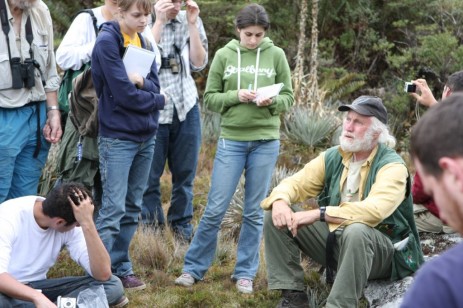Costa Rica
-
More power, less roadkill: How one professor’s landscape has shifted
I took Environmental Studies 101 during my first college semester 20 years ago with Dick Andrus, a professor who has just marked 36 years of teaching at Binghamton University. I thought it’d be good to check back with him and see what he’s talking about in that class now. Q. What are your new Envi […]
-
Costa Rica and Guatemala deals could point to common ground on climate crisis
The Bush administration, Costa Rica, Conservation International, and The Nature Conservancy will today announce a "debt-for-nature" swap that could herald something bigger in the future. The United States will write off $12.6 million in debt owed it by Costa Rica. In exchange, Costa Rica will protect some of the most valuable rainforest wildlife habitat in the world.
 Photo: obooble
Photo: oboobleThis follows the Bush administration's support for an even bigger swap with Guatemala. Of course, the sums involved and the area conserved are relatively puny compared to the global forest destruction caused by the Bush administration, especially through its support for tropically grown biofuels that require deforestation to be grown.
But the Bush administration has always had two sides to its tropical forest policy. Although it's happy to help Cargill, ADM, and other agrigiants despoil the last remaining tropical forests, it's also expressed quiet backing for carbon ranching -- allowing polluters to get global warming credit for protecting forests instead of cleaning up pollution at their own facilities. They like it because saving carbon through protecting forests is generally a lot cheaper than cleaning up industrial pollution, and we should like it because that means we can keep a lot more carbon out of the atmosphere a lot quicker -- and save the forests, their wildlife, and their indigenous people at the same time.
Of course, the Bush administration's quiet backing of this concept is completely worthless right now until the Bush administration backs strict, mandatory limits on greenhouse-gas pollution. Until they do, polluters will have no incentive to actually go ahead and protect those forests (or clean up their own pollution). But that support -- and today's forest conservation actions -- signals that forest conservation may provide some common ground between Democrats and the White House on stopping the climate crisis.
-
Some good news and some bad news
First up is an interview with Jack Ewing, owner of an eco-lodge in Costa Rica. I must admit that writing checks to conservation organizations is about as pleasurable as a trip to the dentist. Spending a week in a place like Hacienda Barú also supports conservation and is a hell of a lot more fun. I managed to photograph about half of the wildlife I saw while staying less than a week in Costa Rica. Best vacation I've ever had. I might put the video (much more interesting than photos) on YouTube one of these days.
After reading that upbeat article, grit your teeth and click on the one about the eminent extinction of the orangutan and understand that palm biodiesel will play a large role in it.
-
As its neighbors back biofuels, Central America gears up for business
Driving down either of El Salvador’s two principal highways, you’re almost sure to end up braking behind a pickup truck that’s jammed with people standing shoulder to shoulder. Occasionally these rural taxis are new vehicles, but most are rickety, rusted, and running on antiquated engines and exhaust-spewing diesel. Even though 48 percent of Salvadorans live […]
-
José A. Zaglul, EARTH University prez, answers questions
José A. Zaglul. What work do you do? I am the president of EARTH University, a private, not-for-profit, international institution. What does your organization do? Our mission is to promote sustainable development in the tropics through the creation of professionals with strong values, solid technical and scientific skills, entrepreneurial spirit, and social and environmental consciousness. […]
-
Free trade agreement threatens Costa Rican environmental protections
Insert oil rig here? When most people think of Costa Rica, they don’t imagine oil rigs stationed off the pristine beaches. Nor do they envision pit mines cutting into the cloud-forested mountains. But, despite the country’s noteworthy conservation efforts, its scenic vistas and extraordinary biodiversity face ongoing threats from extractive industries — and from international […]

